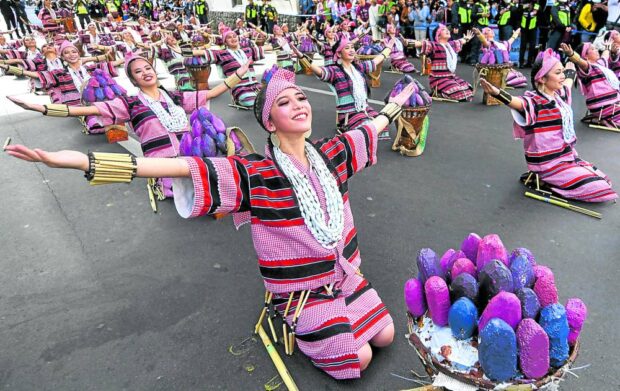Baguio execs seek NCIP rules on ancestral land registration

PIONEERS Tourists often associate the Ibaloys of Baguio with ritual feasts or cultural activities, like Panagbenga (Baguio Flower Festival), where their way of life is depicted in performances. But
the Ibaloys are the city’s original settlers and many of their descendants are nowthe summer capital’s leaders and top professionals. —WILLIE LOMIBAO
BAGUIO CITY — The National Commission on Indigenous Peoples (NCIP) has been asked to draw up long-awaited rules for listing ancestral lands and ancestral domains in local government land registries to further legitimize these indigenous properties as private lands, according to a city council resolution signed on Aug. 14 by Mayor Benjamin Magalong.
The request comes on the heels of a 2022 Department of Justice (DOJ) opinion that Certificates of Ancestral Land or Domain Titles (CALT or CADT) are legitimate documents that should be honored by all agencies in the course of public transactions like applications for building permits.
Section 52 of the 1997 Indigenous Peoples Rights Act (Republic Act No. 8371) requires CALTs and CADTs to be included in the Register of Deeds in their respective localities.
CALTs recognize private home lots which an indigenous peoples (IP) family has occupied “since time immemorial.” CADTs, on the other hand, are much larger tracts of communal land that have been administered for centuries by an IP group.
But many CALTs have not been registered in some areas because the bureaucracy governing land registrations were designed for Torrens titles (conventional land titles), and not special titles like CALTs.
Article continues after this advertisementFollowing a series of policy harmonization meetings with the Land Registration Authority (LRA), the Department of Agrarian Reform (DAR) and the Department of Environment and Natural Resources (DENR), the LRA asked the NCIP for a distinct set of registry guidelines for ancestral land titles in 2016, according to NCIP Cordillera legal officer Arthur Herman during the July 31 session of the city council.
Article continues after this advertisementTo date, the guidelines have yet to be cleared by the NCIP sitting en banc.
Councilor Arthur Allad-iw said Resolution No. 477 Series of 2023 urged the NCIP to finally issue LRA’s requested guidelines covering “the registration of Transfer Certificates of Titles or derivative titles (subdivided properties) emanating from originally issued CALT.”
Security paper
The resolution also noted the LRA’s suggestion that the NCIP issue CALTs and CADTs using the same security paper used by the Bangko Sentral ng Pilipinas, said Allad-iw, who sponsored the measure.
The harmonization talks among land titling agencies began as early as 2005 and were intended to resolve issues such as the overlapping jurisdictions of NCIP, DENR and other “social reform” programs like DAR and its agrarian lands.
For instance, at least 1,198 areas covered by Certificates of Land Ownership Awards in the Cordillera are within ancestral domains, according to DAR’s 2020 Indigenous Peoples Policy Framework Report.
The agencies also worked on common regulations to address the registration of ancestral domains that exceed the territorial boundaries of a town or province.
Resolution No. 477 was a companion measure to Resolution No. 476, also passed on July 31, which directs the City Buildings and Architecture Office to honor CALTs and CADTs submitted by Baguio Ibaloys when they apply for building or fencing permits.
The National Building Code does not include ancestral land titles among the documents it prescribes for granting construction permits.
But in the Dec. 15, 2022, opinion released by Justice Secretary Jesus Crispin Remulla, DOJ said CALTs and CADTs were “considered as recognition of ownership,” and building permits “may be issued on structures built on parcels of land covered by the CADT or CALT that were not nullified through judicial proceeding.”